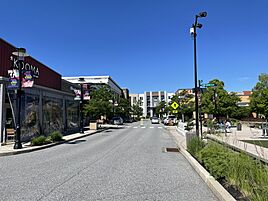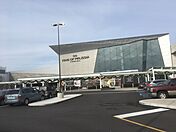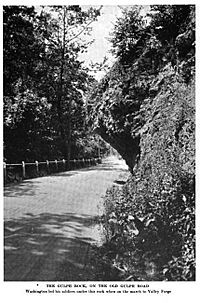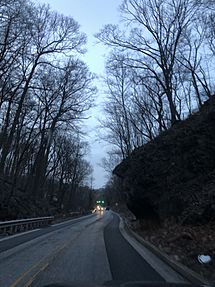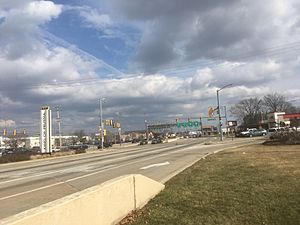King of Prussia, Pennsylvania facts for kids
Quick facts for kids
King of Prussia, Pennsylvania
|
|
|---|---|
|
Main Street at King of Prussia Town Center
KOP sign
King of Prussia mall
King of Prussia Inn, a local tavern
Valley Forge Casino Resort
|
|
| Nickname(s):
KOP
|
|
| Country | United States |
| State | Pennsylvania |
| County | Montgomery |
| Township | Upper Merion |
| Founded | 1719 |
| Named for | King of Prussia Inn |
| Area | |
| • Total | 8.66 sq mi (22.44 km2) |
| • Land | 8.49 sq mi (22.00 km2) |
| • Water | 0.17 sq mi (0.44 km2) |
| Elevation | 200 ft (60 m) |
| Population
(2020)
|
|
| • Total | 24,695 |
| • Density | 2,907.00/sq mi (1,122.43/km2) |
| Time zone | UTC-5 (Eastern (EST)) |
| • Summer (DST) | UTC-4 (EDT) |
| ZIP Code |
19406
|
| Area codes | 610 and 484 |
| GNIS feature ID | 1178473 |
King of Prussia (also known as KOP) is a community in Upper Merion Township, Pennsylvania. It's located in Montgomery County, Pennsylvania, in the United States. This place got its unique name in the 1700s from a local tavern called the King of Prussia Inn. The inn was named after King Frederick the Great of Prussia.
King of Prussia is often called an "edge city" of Philadelphia. This means it's a busy area outside a main city with lots of stores and offices. It's easy to get to because four major highways meet there.
King of Prussia is about 35 miles (56 km) south of Allentown. It's also about 15 miles (24 km) northwest of Philadelphia. It's part of the larger Philadelphia metropolitan area. In 2020, about 24,695 people lived there.
The King of Prussia Mall is one of the largest shopping malls in the United States. It's a very popular place for shopping. Also, the main offices for the Nuclear Regulatory Commission Region I and American Baptist Churches USA are in King of Prussia.
Contents
History of King of Prussia
The famous King of Prussia Inn started as a small house in 1719. It was built by William and Janet Rees, who were Welsh Quakers. They also founded the area known as Reesville.
The house became an inn in 1769. It was a busy place during colonial times. This was because it was about a day's horse ride from Philadelphia. Settlers traveling west to Ohio would often stay there on their first night.
In 1774, the Rees family hired James Berry to run the inn. It then became known as "Berry's Tavern." General George Washington visited the tavern on Thanksgiving Day in 1777. His army was camped nearby at Whitemarsh at the time. A few weeks later, Washington and his army camped at Valley Forge.
A spy map from 1777 called the inn "Berry's." But by 1786, people knew it as the "King of Prussia." It might have been renamed after a funny essay by Benjamin Franklin. This essay was called "An Edict by the King of Prussia." At one point, the inn had a wooden sign showing King Frederick II of Prussia. Today, the inn is on the National Register of Historic Places.
Changes in the 20th Century
The inn had to be moved when U.S. Route 202 was expanded. This highway runs through King of Prussia. The new highway would have destroyed the inn. But people who wanted to save old buildings convinced Pennsylvania to build the highway around it. For over 25 years, the inn was stuck on a grassy island between the highway lanes. It was closed off and surrounded by a fence. In 2000, the inn was moved to a new spot. It opened to the public again in October 2002.
Since the 1960s, King of Prussia has grown a lot with many new buildings. Experts like Joel Garreau call it a perfect example of an "edge city." This means that the most exciting economic growth in a big city area (like Philadelphia) happens outside the main city. Before 1960, King of Prussia was mostly known for Valley Forge National Historical Park. The area grew because four highways met there. This led to the building of the King of Prussia Mall, a big business park, and new homes.
In the late 1980s, a developer named Dennis Maloomian bought a golf course near the mall. He wanted to build a new area with homes and shops, including a town center. Local officials and residents didn't like the idea at first. After many court cases, the Pennsylvania Supreme Court agreed with Maloomian in 2003. This new area became the Village at Valley Forge. It includes a downtown area, apartments, townhouses, and offices. The shopping part is called the King of Prussia Town Center. The first part of the town center opened in 2014 with a Wegmans grocery store. More shops and restaurants have been built since then.
King of Prussia in the 21st Century
By the 2000s, the business park in King of Prussia was getting old. It was losing businesses. In 2009, some building owners pushed for improvements. Changes were made, like adding plants along US 202 and putting up King of Prussia signs. A shuttle service was created to connect the business park to train stations. Rules were also changed to allow apartments and townhouses in the business park. These changes helped bring more businesses back.
In 2016, the two main parts of the King of Prussia Mall, The Plaza and The Court, were connected. A new hallway was built to join them, making it one giant mall.
Geography of King of Prussia
King of Prussia is not an officially incorporated city. However, the United States Postal Service has used the name King of Prussia for its local office since 1837. Its ZIP Code is 19406.
The Census Bureau defines King of Prussia's borders. These include the Schuylkill River to the north and U.S. Route 422 to the west. Bridgeport is to the east, and I-76 is to the south. King of Prussia is about 20 miles (32 km) northwest of Philadelphia.
The area is served by area codes 610 and 484.
People in King of Prussia
| Historical population | |||
|---|---|---|---|
| Census | Pop. | %± | |
| 1990 | 18,406 | — | |
| 2000 | 18,511 | 0.6% | |
| 2010 | 19,936 | 7.7% | |
| 2020 | 24,695 | 23.9% | |
In 2010, the community was mostly White (69.4%). It also had people who were Black or African American (5.7%), Native American (0.3%), and Asian (18.6%). About 2.1% of the people were of two or more races. About 4.2% of the population had Hispanic or Latino family backgrounds. Also, 22.4% of the people living there were born in other countries.
Climate in King of Prussia
The weather in King of Prussia has hot, humid summers. Winters are cool to cold. The climate is now considered humid subtropical. This means it has warm temperatures for most of the year. The hardiness zone is 7a, which is good for many types of plants.
| Climate data for King of Prussia, Pennsylvania | |||||||||||||
|---|---|---|---|---|---|---|---|---|---|---|---|---|---|
| Month | Jan | Feb | Mar | Apr | May | Jun | Jul | Aug | Sep | Oct | Nov | Dec | Year |
| Record high °F (°C) | 76 (24) |
75 (24) |
83 (28) |
98 (37) |
98 (37) |
100 (38) |
108 (42) |
106 (41) |
102 (39) |
90 (32) |
85 (29) |
76 (24) |
108 (42) |
| Mean daily maximum °F (°C) | 40 (4) |
44 (7) |
53 (12) |
64 (18) |
74 (23) |
83 (28) |
87 (31) |
86 (30) |
78 (26) |
67 (19) |
56 (13) |
45 (7) |
65 (18) |
| Mean daily minimum °F (°C) | 22 (−6) |
24 (−4) |
31 (−1) |
41 (5) |
51 (11) |
61 (16) |
66 (19) |
64 (18) |
56 (13) |
44 (7) |
35 (2) |
27 (−3) |
44 (6) |
| Record low °F (°C) | −12 (−24) |
−5 (−21) |
8 (−13) |
15 (−9) |
29 (−2) |
28 (−2) |
48 (9) |
40 (4) |
35 (2) |
26 (−3) |
14 (−10) |
−10 (−23) |
−12 (−24) |
| Average precipitation inches (mm) | 3.40 (86) |
3.17 (81) |
4.00 (102) |
4.03 (102) |
4.21 (107) |
3.98 (101) |
4.76 (121) |
4.37 (111) |
4.87 (124) |
3.73 (95) |
3.80 (97) |
4.17 (106) |
48.49 (1,233) |
| Source: The Weather Channel | |||||||||||||
| Climate data for Norristown, Pennsylvania (1991–2020 normals, extremes 1951–present) | |||||||||||||
|---|---|---|---|---|---|---|---|---|---|---|---|---|---|
| Month | Jan | Feb | Mar | Apr | May | Jun | Jul | Aug | Sep | Oct | Nov | Dec | Year |
| Record high °F (°C) | 76 (24) |
78 (26) |
84 (29) |
98 (37) |
98 (37) |
100 (38) |
108 (42) |
106 (41) |
102 (39) |
92 (33) |
85 (29) |
76 (24) |
108 (42) |
| Mean daily maximum °F (°C) | 41.7 (5.4) |
43.5 (6.4) |
52.1 (11.2) |
64.8 (18.2) |
74.8 (23.8) |
84.0 (28.9) |
88.8 (31.6) |
86.5 (30.3) |
80.0 (26.7) |
68.4 (20.2) |
56.8 (13.8) |
46.3 (7.9) |
65.6 (18.7) |
| Daily mean °F (°C) | 32.1 (0.1) |
34.1 (1.2) |
41.8 (5.4) |
53.1 (11.7) |
63.4 (17.4) |
73.0 (22.8) |
77.7 (25.4) |
75.9 (24.4) |
68.8 (20.4) |
56.5 (13.6) |
45.9 (7.7) |
37.3 (2.9) |
55.0 (12.8) |
| Mean daily minimum °F (°C) | 22.6 (−5.2) |
24.7 (−4.1) |
31.6 (−0.2) |
41.5 (5.3) |
52.1 (11.2) |
62.0 (16.7) |
66.6 (19.2) |
65.2 (18.4) |
57.6 (14.2) |
44.6 (7.0) |
35.1 (1.7) |
28.3 (−2.1) |
44.3 (6.8) |
| Record low °F (°C) | −12 (−24) |
−5 (−21) |
8 (−13) |
15 (−9) |
29 (−2) |
41 (5) |
48 (9) |
40 (4) |
35 (2) |
26 (−3) |
14 (−10) |
−10 (−23) |
−12 (−24) |
| Average precipitation inches (mm) | 3.66 (93) |
2.98 (76) |
4.41 (112) |
3.90 (99) |
4.25 (108) |
4.20 (107) |
4.70 (119) |
4.98 (126) |
4.91 (125) |
4.32 (110) |
3.61 (92) |
4.73 (120) |
50.65 (1,287) |
| Average snowfall inches (cm) | 6.8 (17) |
10.9 (28) |
3.0 (7.6) |
0.2 (0.51) |
0.0 (0.0) |
0.0 (0.0) |
0.0 (0.0) |
0.0 (0.0) |
0.0 (0.0) |
0.1 (0.25) |
0.1 (0.25) |
4.2 (11) |
25.3 (64) |
| Average precipitation days (≥ 0.01 in) | 11.0 | 9.4 | 11.1 | 12.8 | 14.1 | 11.9 | 10.7 | 10.4 | 8.9 | 11.2 | 9.3 | 10.5 | 131.3 |
| Average snowy days (≥ 0.1 in) | 3.3 | 2.9 | 1.6 | 0.1 | 0.0 | 0.0 | 0.0 | 0.0 | 0.0 | 0.1 | 0.1 | 1.4 | 9.5 |
| Source: NOAA | |||||||||||||
Economy and Jobs
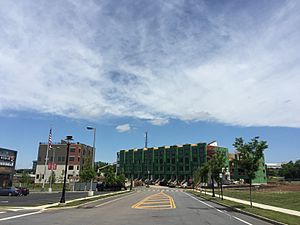
King of Prussia has many job opportunities. The number of jobs is expected to grow by 38% over the next ten years. A big reason for this is the King of Prussia Mall. It's one of the largest shopping centers in the United States.
The mall has over 450 stores, including many fancy ones. It also has 8 main department stores and more than 40 restaurants. About 22 million people visit the mall every year. It brings in over $1.1 billion in sales each year.
There's also a large business park northwest of the mall. It has over 60 companies on 676 acres. About 60,000 people work in King of Prussia. This is three times more than the number of people who live there!
King of Prussia is also home to the main office of Nuclear Regulatory Commission Region I. This group watches over 25 nuclear power reactors in the Northeastern United States.
Here are some of the biggest employers in King of Prussia:
| # | Employer | # of Employees | Community |
|---|---|---|---|
| 1 | GlaxoSmithKline | 2,259 | King of Prussia |
| 2 | Lockheed Martin | 2,255 | King of Prussia |
| 3 | Valley Forge Colonial LTD | 1,117 | King of Prussia |
| 4 | US Liability Insurance Co. | 938 | King of Prussia |
| 5 | Phila. Media Newspapers Inc. | 843 | King of Prussia |
| 6 | Radial | 742 | Wayne |
| 7 | Arkema | 639 | King of Prussia |
| 8 | BNY Mellon Investment Servicing | 638 | King of Prussia |
| 9 | HIBU of PA | 635 | King of Prussia |
| 10 | Commonwealth of PA | 574 | King of Prussia |
In 2010, major property owners in King of Prussia created the King of Prussia District (KOP-BID). This group works to make the area better. They help market the area and support policies that keep King of Prussia a strong place for business.
Sports Activities
The Philadelphia Freedoms tennis team used to play in King of Prussia in 2008 and 2009. For their matches, a temporary tennis stadium was built in the King of Prussia Mall parking lot. It could hold 3,000 people. In 2010, the Freedoms moved to The Pavilion at Villanova University.
Education and Learning
Schools in the Area
Students in King of Prussia go to public schools in the Upper Merion Area School District. There are five elementary schools: Bridgeport, Caley, Candlebrook, Gulph, and Roberts. All students in the district also attend Upper Merion Area Middle School and Upper Merion Area High School.
King of Prussia also has a private school called Mother Teresa Regional Catholic School. It was created in 2012 when two other schools joined together.
Colleges and Higher Education
The Penn State Great Valley campus was once located in King of Prussia from 1963 to 1974. It then moved to Great Valley. In 1982, the college opened a new facility called Penn State King of Prussia Center.
Fun Places to Visit
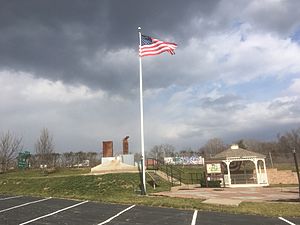
King of Prussia is famous for the King of Prussia Mall. It's one of the biggest malls in the United States. The mall has over 450 stores, 8 main department stores, and more than 40 restaurants. Many luxury stores have their only Philadelphia area location here.
Around the mall, you'll find many other large stores, restaurants, hotels, and businesses. These include a United Artists Theatres movie theater and an iFLY indoor skydiving center. The King of Prussia Town Center is another popular spot. It has a Wegmans grocery store, other big stores, and a downtown area with places to eat, shop, and get services. It also has a Town Square. The town center is part of the Village at Valley Forge. This is a large area being built with shops, apartments, townhouses, offices, and a Children's Hospital of Philadelphia center.
King of Prussia is also home to the Valley Forge Casino Resort. This resort has over 500 hotel rooms, many slot machines and table games, sports betting, and seven restaurants. It also has a spa, nightlife, and a convention center. You can even find a seasonal poolside club called Valley Beach.
Right next to King of Prussia is Valley Forge National Historical Park. This park is a very important historical site. It's where General George Washington and the Continental Army camped during the winter of 1777–78 in the American Revolutionary War.
You can also visit the King of Prussia Volunteer Fire Company 9/11 Memorial. This memorial honors the lives lost in the September 11 attacks. It was built in 2011 and has two steel beams from the World Trade Center in New York City. The memorial is next to the King of Prussia Volunteer Fire Company station.
Getting Around King of Prussia
Transportation Options
King of Prussia has always been an important place where roads meet. Today, four major highways come together here. The Schuylkill Expressway (I-76) goes to Center City Philadelphia, which is about 19 miles (31 km) away. This highway ends in King of Prussia at the Pennsylvania Turnpike. The Turnpike is a toll road that goes across Pennsylvania. It heads west towards Harrisburg (as I-76) and east towards New Jersey (as I-276).
The US 422 freeway starts near the center of King of Prussia. It goes northwest to Pottstown and Reading. Thanks to new construction, you can now drive directly from Reading to Philadelphia without going onto US 202.
US 202 is the only major highway that becomes a regular road through the area. It goes southwest towards West Chester as a freeway. It heads northeast towards Norristown as Dekalb Pike, which is a surface road.
Important local roads include PA 23, Gulph Road, and Henderson Road.
The Pennsylvania Department of Transportation District 6 office is in King of Prussia. This office serves several counties in the area.
King of Prussia has public transportation provided by SEPTA Suburban Division bus routes. These buses connect to places like West Chester, Norristown Transportation Center, Phoenixville, and Center City Philadelphia. The King of Prussia Transit Center at the mall is a main stop. The Gulph Mills station is also served by SEPTA's Norristown High Speed Line. This line runs between the 69th Street Transportation Center and the Norristown Transportation Center.
The Greater Valley Forge Transportation Management Association runs The Rambler. This is a shuttle service that goes around King of Prussia. It helps people get to homes, shops, the mall, medical places, and the Upper Merion Senior Center.
You can also find intercity bus services from King of Prussia. OurBus goes to Manhattan in New York City. Fullington Trailways and Greyhound Lines also have stops here.
King of Prussia is about 18 miles (29 km) from 30th Street Station in Philadelphia. This station has train service from Amtrak. It's also about 26 miles (42 km) from Philadelphia International Airport, which has flights to many places.
Norfolk Southern Railway operates freight trains through King of Prussia. There are also several trails for hiking and biking in the area. These include trails in Valley Forge National Historical Park. The Schuylkill River Trail connects Valley Forge to Manayunk in Philadelphia. A section of the Chester Valley Trail also passes through King of Prussia.
Utilities and Services
Electricity and natural gas in King of Prussia come from PECO Energy Company. Water is provided by Aqua Pennsylvania and Pennsylvania American Water. The Upper Merion Township Public Works Department handles wastewater services. Private companies collect trash and recycling.
Famous People from King of Prussia
- The Bloodhound Gang – A funny rock band that started in the early 1990s.
- Jobriath Boone – A musician and actor.
- Charlie Brenneman – A mixed martial arts fighter.
- Brianna Butler – A basketball player.
- William Colepaugh – An American seaman who became a German spy during World War II.
- Michael J. Fitzgerald – A Roman Catholic auxiliary bishop.
- Greg Gianforte – A businessman and former U.S. Representative, now Governor of Montana.
- Kathy Jordan – A professional tennis player.
- Ann Li – A tennis player.
- Bill Nuttall – A former soccer player and sports business owner.
- Bob Odell – A former football player and coach.
- Rafael Robb – An economist and former college professor.
- Jonathan Roberts – A U.S. Representative and U.S. Senator in the 1800s.
- Lisa Salters – An ESPN sports reporter.
- Fred Sherman – An economist, businessman, and business commentator.
- Artie Singer – A songwriter, music producer, and bandleader.
- Jay C. Smith – A former principal at Upper Merion Area High School.
- Blair Thomas – A former National Football League running back.
See also
 In Spanish: King of Prussia para niños
In Spanish: King of Prussia para niños
 | George Robert Carruthers |
 | Patricia Bath |
 | Jan Ernst Matzeliger |
 | Alexander Miles |


